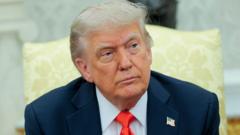Is Antifa Now a Domestic Terrorist Organization According to Trump?

Published: 2025-09-23 00:20:22 | Category: wales
In a significant move, President Donald Trump has designated Antifa as a "domestic terrorist organisation," a decision aimed at combatting what he terms the "radical left." This designation enables the administration to investigate and disrupt Antifa's activities, although questions remain about how such a loosely organised group can be effectively targeted. The announcement follows the assassination of conservative activist Charlie Kirk, with authorities still probing the case and its connection to Antifa.
Last updated: 16 October 2023 (BST)
Key Takeaways
- Antifa has been designated as a "domestic terrorist organisation" by President Trump.
- The designation allows for investigations and disruptions of Antifa's activities.
- Questions arise regarding the effectiveness of targeting a decentralised group like Antifa.
- The assassination of Charlie Kirk catalysed this action, though no direct link to Antifa has been established.
- Antifa is often portrayed as a violent group by critics, while its supporters argue they act in self-defence.
Understanding Antifa: Origins and Ideology
Antifa, short for "anti-fascist," is a decentralised movement primarily opposing far-right and fascist ideologies. The term originates from the German word "antifaschistisch," reflecting the anti-fascist groups that emerged in 1930s Germany. The movement in the United States has roots that extend back several decades, but it gained notoriety after the election of Donald Trump in 2016 and events like the Charlottesville rally in 2017.
Antifa is not a formal organisation; it lacks a central leadership or membership roster. Instead, it comprises various collectives and individuals who align on anti-fascist principles, including anarchists, socialists, and other leftist activists. This organic structure allows for spontaneous formation and actions, both online and in real-world protests.
The Current Political Context
Trump's decision to designate Antifa as a domestic terrorist organisation marks a notable shift in the government's approach to domestic extremism. Historically, such designations have been reserved for foreign organisations. This move enables the administration to potentially seize assets, ban members, and conduct deeper investigations into those affiliated with Antifa.
In the wake of the assassination of Charlie Kirk, a conservative activist, Trump has intensified his rhetoric against the "radical left," claiming that political violence has adversely affected innocent lives. The president's reference to Antifa as a "sick, dangerous, radical left disaster" underlines the administration's narrative that links leftist ideologies with violent actions.
The Impact of the Designation
The designation of Antifa as a domestic terrorist organisation brings several implications:
- Enhanced Investigative Powers: The federal government can now allocate resources to investigate Antifa's activities more robustly.
- Potential Asset Seizures: Federal agencies may have the authority to freeze or seize assets associated with individuals deemed part of Antifa.
- Increased Surveillance: A designation may lead to heightened surveillance of suspected Antifa members and their activities.
However, challenges remain. Given Antifa's lack of formal structure, the practical application of these powers raises questions about how effectively the government can act against such a fluid movement. Critics argue that the designation may lead to unnecessary crackdowns on peaceful protestors who may not align with the more militant factions of Antifa.
Violence and Controversy
Critics of Antifa often highlight instances of violence at protests, claiming that some activists engage in aggressive tactics that undermine their anti-fascist message. For instance, during the unrest following George Floyd's death in 2020, a self-proclaimed Antifa member was involved in the shooting of a Patriot Prayer supporter, sparking national debate over the movement's approach to activism.
Supporters of Antifa, however, argue that their actions are largely in self-defence against far-right violence. They contend that the media portrayal often exaggerates incidents of violence while downplaying the systemic issues they seek to confront. This dichotomy complicates the narrative surrounding Antifa, making it a polarising topic in contemporary American politics.
Future Implications of the Designation
As the government prepares to act on this designation, several factors will influence its effectiveness:
- Legal Framework: The existing laws governing terrorist designations may not neatly apply to a domestic group like Antifa, leading to potential legal challenges.
- Public Perception: The government’s actions may influence public opinion regarding Antifa, potentially polarising the electorate further.
- International Comparisons: Other countries have dealt with similar movements in various ways, which may offer insights into effective strategies or cautionary tales.
Conclusion
The designation of Antifa as a domestic terrorist organisation represents a significant moment in the ongoing battle over ideological extremism in the United States. While it provides the government with new tools to combat what it perceives as a threat, the reality of targeting a decentralised movement like Antifa poses unique challenges. As investigations unfold and actions are taken, the implications for civil liberties, political discourse, and public safety will be closely scrutinised. What remains to be seen is how effectively these measures can be implemented without infringing on the rights of peaceful protestors and activists.
As the political landscape evolves, the discourse surrounding Antifa will likely continue to be contentious, prompting further discussions on the balance between safety and freedom of expression. #Antifa #DomesticTerrorism #PoliticalViolence
FAQs
What is Antifa?
Antifa, short for anti-fascist, is a loosely organised movement that opposes fascist and far-right ideologies. It comprises various groups and individuals who share anti-fascist principles.
Why has Trump designated Antifa as a terrorist organisation?
Trump's designation of Antifa as a domestic terrorist organisation aims to crack down on what he perceives as radical left violence, following the assassination of conservative activist Charlie Kirk.
What are the implications of this designation?
The designation allows for enhanced investigations, potential asset seizures, and increased surveillance of individuals associated with Antifa, though its effectiveness is still debated.
Is there a direct link between Antifa and the assassination of Charlie Kirk?
Currently, there is no evidence directly linking Antifa to the assassination of Charlie Kirk. The alleged perpetrator has not been confirmed as part of Antifa.
How do supporters of Antifa justify their actions?
Supporters often argue that their actions, including protests and clashes, are primarily acts of self-defence against far-right violence, rather than seeking to instigate conflict.



